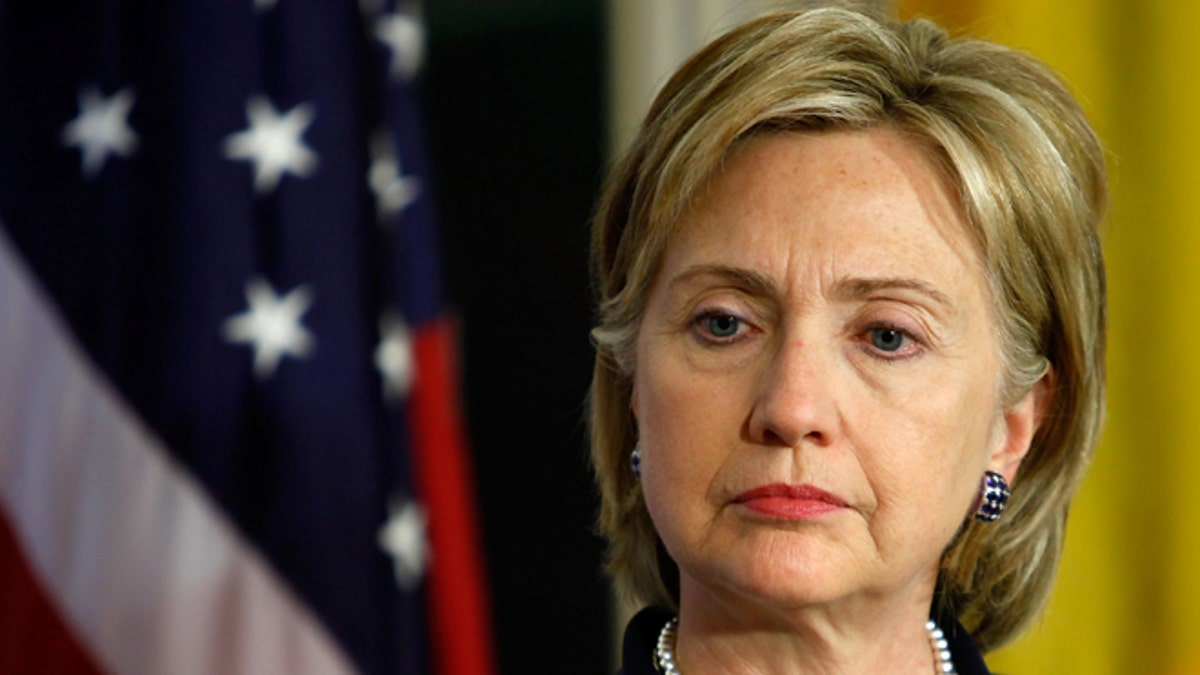
Clinton at a State Department press conference on August 18, 2009 in Washington, DC. (2009 Getty Images)
In the aftermath of the 2009 coup that overthrew Honduran President Manuel Zelaya, then-Secretary of State Hillary Clinton requested the assistance of a prominent D.C. lobbyist to act as a back channel with the interim government in Tegucigalpa, even as the United States was denouncing the putsch.
According to emails released this week from Clinton's private server, the former secretary of state and presidential candidate asked if Lanny Davis, a lobbyist and former White House Counsel to Bill Clinton, could help in the talks with then-interim Honduran President Roberto Micheletti.
"Can he help me talk w/ Micheletti?" Clinton asked in an email with the subject "Lanny Davis."
At the time, Davis was being retained by the Business Council of Latin America (CEAL), a coalition of Honduran businessmen who had supported Zelaya's ouster, and while it is unclear what Clinton wanted to talk about with Davis and Micheletti, the email exchange appears to cast the U.S.' public denouncement of the post-coup government and the pronouncements that Washington was working to restore a democratically president in a poor light.
The Honduran coup took place on the morning of June 28, 2009 when about 100 soldiers stormed the presidential palace in Tegucigalpa, forcibly removed Zelaya from the premises and flew him to San José, Costa Rica. Citing a plot by Zelaya to eliminate presidential term limits and create a socialist state in the vein of Venezuela's Hugo Chávez, the National Congress later that day voted to remove Zelaya from office and swore in Micheletti, the Speaker of Congress, as president.
In the next few months, there were mass protests and violence between demonstrators and police. Many countries, including the U.S., refused to recognize the interim government and the United Nations called for Zelaya’s reinstatement. During the turmoil, Zelaya snuck back into Honduras (in September 2009) and holed himself up in the Brazilian Embassy.
Clinton's request for Davis to speak with Micheletti came one week before she was able to broker a deal to reinstall Zelaya through a national unity government. The deal, however, fell through as a loophole allowed the Honduran legislature to veto his return and Honduras held elections on November 29, 2009.
Porfirio Lobo, of the conservative Partido Nacional, won the election and was installed as president two months later. That same day, January 27, 2010, Zelaya flew into exile to the Dominican Republic, after Lobo and then-Dominican President Leonel Fernández worked out a deal to ensure Zelaya’s safe passage out of Honduras.
The elections were marred by violence, with the killing of a number of anti-coup organizers and journalists and widespread suppression of protestors and opposition media.
The newly released emails also appear to indicate that the U.S. State Department at the time had no intention of helping restore Zelaya to power and instead wanted him removed from office, as he was seen as being too friendly with socialist governments like Chávez's Venezuela and Daniel Ortega's Nicaragua.
"The turnout (probably a record) and the clear rejection of the Liberal Party shows our approach was the right one, and puts Brazil and others who would not recognize the election in an impossible situation," Assistant Secretary of State Thomas Shannon told Clinton in an email. "[T]his administration, which worked so hard to manage and resolve the crisis, should be the one who defines the results and perceptions of today's vote."
Since the coup, Honduras' murder rate has held the title of the world's highest, has seen presidential term limits abandoned and has recently been ranked the 49th most corrupt country in the world.
